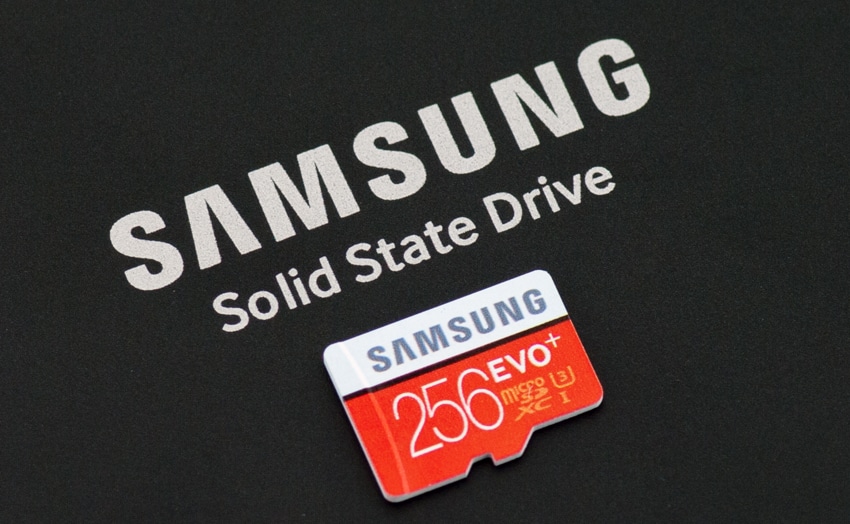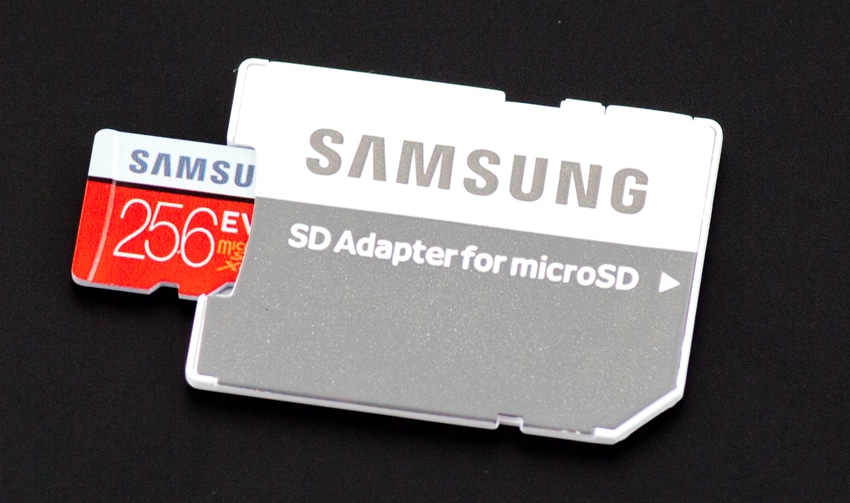Samsung’s expansion of their EVO Plus memory card line marks them as one of the first vendors to offer 256GB of storage in a microSD form factor. As with most major memory card vendors, Samsung has added the 256GB model to accommodate the growing resolution of pictures and videos and devices that capture them such as GoPro cameras and drones; with the new EVO Plus, users can store up to 55,200 photos, 33 hours of HD video, or 12 hours of 4k UHD video.

Although the EVO Plus isn’t Samsung’s flagship “performance” card, it can still write files at a reported speed of 90MB/s (95MB/s read), which is well above the most recent EVO Plus card. Samsung utilized the world’s first 48-cell layer V_NAND with the EVO Plus, which allows it to retain strong transfer speeds while achieving a storage density that surpasses that of most other memory cards. Having been built for durability as well, the Samsung EVO is waterproof, temperature-proof, X-ray-proof, and magnetic-proof.
The Samsung EVO Plus has a $250 price tag and includes a 10-year warranty.
Specifications
- Capacity: 256GB of content storage
- Samsung 4-Proof Features:
- Waterproof (IEC 60529, IPX7)
- Temperature-proof
- X-ray-proof
- Magnetic-proof
- Transfer Speeds: Read and write speeds of up to 95MB/s and 90MB/s, respectively
- Speed Class: UHS-1, Class 10, (U3) compatible
- Warranty: Limited 10-year
Design and Build
The Samsung EVO Plus 256GB is more or less identical to the 128GB model; the face of the card is white and red with branding and the capacity written in white. Other product information, including the card type (microSD) and speed class are also on the face of the card.

The back of the card is mostly plain black, with the exception of the nine gold connector pins and model number.
Performance
Using our Consumer Testing Platform, we measured the wireless transfer speeds from the Samsung EVO Plus 256GB card with IOMeter. We have included the following memory cards for comparison, although it should be noted that the EVO Plus 256GB is the first microSD that we have tested in this capacity:
In our 2MB sequential benchmark, the EVO Plus 256GB card posted the strongest numbers that we have seen out of any microSD: 89.8MB/s read and 83MB/s write. The Samsung PRO was the closest in terms of performance (89.2MB/s and 83.7MB/s in read and write, respectively), followed by the EVO Plus 128GB card (84.9MB/s and 19.7MB/s, respectively) and the Patriot LX (81.07MB/s and 20.77MB/s, respectively).
The EVO Plus 256GB card slipped a bit in our 2MB random benchmark, posting 85.7MB/s read and 2.4MB/s write. Although it’s write performance was the weaker than its comparable cards, its read performance was still quite strong. The Samsung PRO surpassed the EVO Plus 256GB in terms of both read and write (86.1MB/s and 4.7MB/s, respectively), and the EVO Plus 128GB (79.5MB/s read and 3.9MB/s write) and Patriot LX (58.66MB/s read and 6.57MB/s write) each outpaced the EVO Plus 256GB in terms of write performance.
In our random 4k benchmark, the EVO Plus 256GB posted 1,243 IOPS and 413 IOPS (read and write, respectively), and the Patriot LX posted 982 IOPS and 255 IOPS (read and write, respectively).
Conclusion
The EVO Plus 256GB is a strong addition to Samsung’s repertoir of microSD cards. In addtion to its novelty as one of the few 256GB microSD cards on the market, the new EVO Plus exhibits a huge improvement in performance compared to the previous model; in terms of sequential transfers, the EVO Plus 256GB has write speeds that outpace Samsung’s performance card (i.e., PRO Plus). In the context of the market as a whole, there aren’t many microSD cards that can compete with the EVO Plus. Although media professionals and enthusiasts would likely have a hard time to finding a better option, the EVO Plus might be unnecessary for casual users.
Samsung has further incentivized consumers to consider the EVO Plus by including a 10-year warranty. Considering the extent to which the storage market will likely change between now and then, this might even mean that certain users would never need to buy another microSD. Furthermore, Samsung has outfitted the EVO Plus with a durable chassis to ensure that it lasts that long. As far as performance goes, the 256GB EVO Plus showed strong performance coming out on top of our 2MB sequential tests with 89.2MB/s read and 83.7MB/s write. While not the overall top performer in 2MB random, the 256GB EVO Plus had another strong performance with 85.7MB/s read and 2.4MB/s write.
Pros
- Huge storage density
- 10-year warranty
- Great overall performance
Cons
- Early adoptrrs will pay the price premium
The Bottom Line
As one of the fastest and largest-capacity microSD cards available, the EVO Plus is a compelling option for serious users. Samsung designed this card with an emphasis on durability and backs it with a 10-year warranty.




 Amazon
Amazon